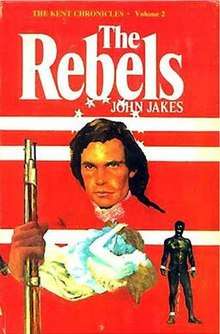The Rebels (Jakes novel)
The Rebels is a historical novel written by John Jakes, originally published in 1975, the second in a series known as The Kent Family Chronicles or the American Bicentennial Series. The novel mixes fictional characters with historical events and figures, to narrate the story of the nascent United States of America during the time of the American Revolution. While the novel continues the story of Philip Kent, started in The Bastard, a large portion focuses on Judson Fletcher, a newly introduced character, as a different rebel. In 1979, the novel was made into a television film by Operation Prime Time, The Rebels.[1]
 First edition | |
| Author | John Jakes |
|---|---|
| Country | United States |
| Language | English |
| Series | The Kent Family Chronicles |
| Genre | Historical fiction |
Publication date | 1975 |
| Media type | |
| Pages | 432 |
| ISBN | 0515092061 |
| Preceded by | The Bastard |
| Followed by | The Seekers |
Plot summary
The story begins on June 17, 1775, at the Battle of Bunker Hill, in which Philip Kent participates. One major event, the marriage of Philip and Anne Ware, took place in the interim. In September of that year Anne gave birth to her first child, whom they named Abraham after her father. Philip then participated in Henry Knox’ mission to transport cannons from Fort Ticonderoga.
Meanwhile, Judson Fletcher, a drunkard and a womanizer still pursued Peggy Ashford McLean, the wife of his friend Seth McLean, whom he had courted before her marriage. Judson lived with his father on Sermon Hill, a large tobacco plantation on the Rappahannock River in northern Virginia. During a great rebellion of slaves Peggy was raped, Seth killed; Angus Fletcher, opposed to Judson's defense of black slaves (and his accusation of white violence that caused it) and his way of life, put his son out of house.
Judson’s brother, Donald, was a Virginia delegate to the Second Continental Congress, but he suffered from gout and was unable to fulfill his duty, so designated Judson to act in his stead. While attending Congress in Philadelphia, Judson began an affair with Alicia Parkhurst, who now called herself Alice, a former lover of Philip Kent’s. When Tobias Trumbull, Alicia’s uncle, found her, he tried to take her home, which Judson prevented, after which Trumbull challenged Judson to a duel and scheduled it for July 3, 1776. The day before the duel, during a debate on the Lee Resolution, Judson was dismissed from the Virginia delegation for drunkenness and therefore missed his chance to vote on the resolution. The next day, he killed Trumbull in the duel and shortly afterwards, Alicia committed suicide by drowning.
While Philip was camped with George Washington’s army in August 1777, he was reunited with his old friend from France, Gil, the Marquis de Lafayette. They participated in the devastating Battle of Brandywine, which left Philadelphia, then the American capital, to be captured by the British.
After his expulsion from the Virginia delegation, Judson returned home, but could not move back to Sermon Hill with his father; instead, he lived with Lottie Shaw at a place once owned by her late husband. One day, in a drunken rage, he expelled her from her own property. Soon after, he visited Peggy McLean, by then a widow, and raped her; unbeknownst to him, this encounter would produce a daughter, Elizabeth. Later, when his brother told him that George Rogers Clark had returned to Virginia, Judson rode to meet him. Clark had been a childhood friend and was now recruiting men for a military expedition to the Northwest Territory. Judson enlisted with him, but when he returned home he was met by a disgruntled Lottie, who shot him and left him for dead.
Though Judson, because of his wounds, missed his rendezvous, once he recovered he set off for Pittsburgh in hopes of meeting Clark. When he was reunited with Clark, Clark refused to include him in his detachment, due again to drunkenness. On returning to his boat, Clark caught a spy in the act of stealing his orders. After a scuffle the spy shot at Clark, but Judson absorbed the ball and was mortally wounded.
Meanwhile, Anne Kent had taken the money she had inherited from her father, who had recently died, and invested it with privateers who were aiding the Americans on the high seas. During the time that Philip was away with the army, one of the privateers with whom Anne had invested her money, Malachi Rackham, made overtures towards her, which she rejected. In 1778, he abducted her and took her aboard his ship. After he repeatedly beat and raped her, she fought for her freedom, but in the ensuing struggle both Anne and Rackham were thrown overboard.
Philip participated in the Battle of Monmouth and was wounded in the leg, after which he was mustered out of the army. He was informed of Anne’s disappearance in a letter from the captain of the privateer in which Anne had invested. As the privateer had captured a British vessel, the investment provided Philip with the money he utilised to begin a publishing firm, Kent and Son. Almost a year later, Gil introduced Philip to Peggy McLean, who would become his second wife.
Historic figures Philip Kent interacts with throughout the novel
- George Washington
- Henry Knox
- Marquis de Lafayette
- Anthony Wayne
- Friedrich von Steuben
Historic figures Judson Fletcher interacts with throughout the novel
- George Rogers Clark
- Benjamin Franklin
- Thomas Paine
- John Adams
- Richard Henry Lee
- Francis Lightfoot Lee
- Thomas Jefferson
- John Dickinson
References
- "'Rebels' Continues Kent Family Saga". The Pittsburgh Press. 13 May 1979. Retrieved 4 July 2013.